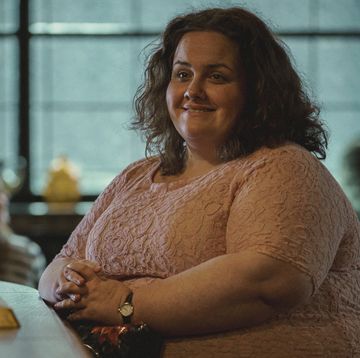It takes a special kind of woman to tell you that you have men's legs, that you've forgotten to put on deodorant, that you're going grey, you need to wear lipstick, your bedroom is dingy, your boyfriend has moved on, you've got bad posture, you dress like a man and might never find love again.
That woman is called a mother. And if we're lucky enough, many of us have our own.
From short legs to speed cooking, thick hair to impatience, thin lips to a swift wit, my mother doesn't just take credit for most of my attributes, she seems to see my body as a repository for all the strengths, weaknesses, idiosyncracies and failures of her own genes.
She knitted me together in her womb and so, by extension, she has the right to pick me apart now. I know where she gets it, of course, this tiger-like love and knack for criticism. She was schooled by the Zen master of the crippling one-liner: her own mother.
Well into her nineties, my stately, Queen-like grandmother would hold forth in her large vibrating armchair telling my mother that she'd lost her looks, that I had got 'meaty' and that my sister looked like something that belonged in a pie. She loved us, defended us till her death, poured out coffee and affection to us endlessly but, my god, was she quick to point out our faults.
And so, the sting in the tale, the bite in the embrace and the criticism in the wisecrack passed down from generation to generation like freckles. I can only imagine what I'll say to my daughters, if I'm lucky enough to have any.
According to a survey carried out by netmums.com, mothers are twice as likely to be critical of their daughters than their sons, over a quarter said they loved their sons in a different way to their daughters and 21.5% said they let their sons get away with more. It is Monica and Ross Geller writ large. For many daughters, this 'different' quality of love is characterised by an attitude to weight. Or, to put it bluntly, an obsession with fat. 'My mum was constantly making comments and having chats about my weight,' one woman told me anonymously on Twitter. 'It has led me to have terrible self-esteem issues, including an on-and-off eating disorder she never took seriously and bouts of near depression.'
Dr Leslie Sim, clinical director of the Mayo Clinic, has argued that the mother-daughter relationship is 'the most important influence on a daughter's body image,' while psychologists Beth A. Abramovitz and Leann L. Birch report that even at the age of five, girls whose mothers were on a diet were twice as likely to be aware of, and have ideas about, dieting. As young women, we learn by example, which all too often means inheriting a disordered attitude to food and dissatisfaction with our bodies, along with a great aunt's wedding ring and collection of mismatched Tupperware.
Luckily, my mother seems sanguine about my size. It may be many times bigger than my sister's and it may occasionally slide into saturated girth, but my body doesn't, on the whole, seem to cause Mum any sleepless nights. If only the same could be said for my grammar, my love life, my career, my mental health and my clothes. And therein lies the rub: our mothers worry about our bodies, our lives, our loves and our losses because we are the flesh of their flesh. They made us, they quite literally brought us into the world, they poured out the best of their genes and the worst of their habits in bringing us up and so it is little wonder they struggle sometimes to draw the line between us and them.
The bitter things our mothers tell us are almost always born of thoughtlessness, not cruelty. It is a lack of care, not a lack of love that makes a mother tell her daughter that she shouldn't wear trousers with those thighs. That she's spent the savings on a new kitchen because they've given up waiting for her to get married.
That she's got nothing to be anxious about. That she 'only needs to lose a bit of weight'. Or, in the case of one friend, to stand in front of the window of a charity shop just days after a break-up, aged 17, and sigh, 'But who's ever going to marry us?'
My mother and I fit together like spoons and are just as likely to stir things up. We may argue and criticise, pick holes and pick fights, split hairs and spit dust, but it is only because we are forever jumbled up in a love that cannot be undone. As Charles Dickens never said: ‘I am the best of her, I am the worst of her. I am her wisdom and her foolishness, her spring of hope and her winter of despair.’
Follow @NELLFRIZZELL on Twitter












